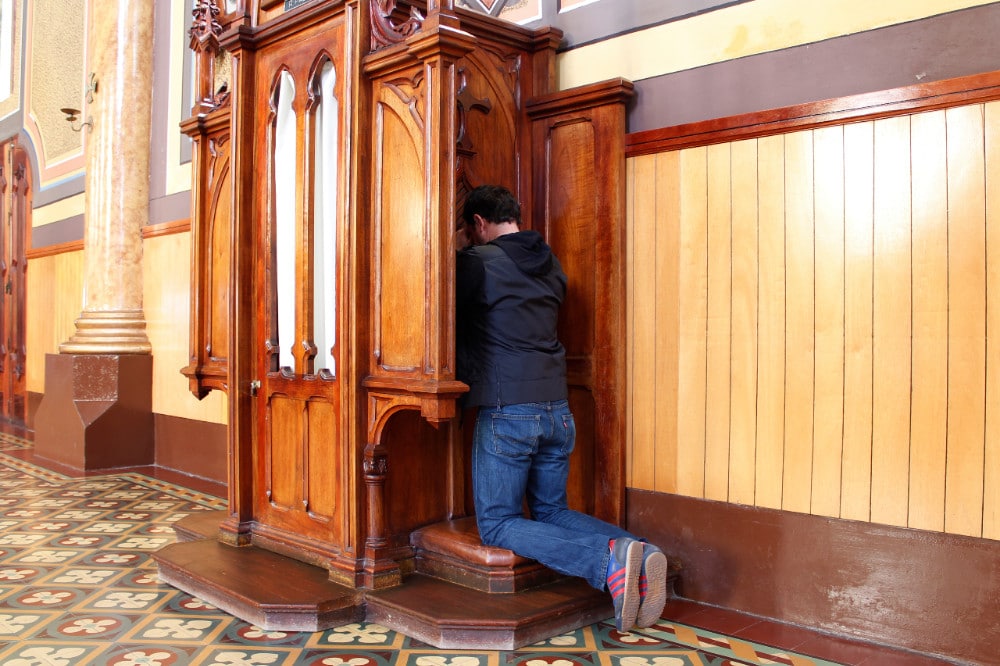
— Name withheld, Studio City, California
Answer: When one confesses their sins, they are forgiven from all the sins they have committed since their last confession. Since it is not possible to remember or state every single venial (or smaller) sin, it is sufficient to mention non-mortal sins in a general way, such as, “I am guilty of anger, gossip or inattentiveness at prayer,” and so forth. However, one is only required to state serious sins in kind and number, such as, “I committed the sin of looking at pornography on two occasions.” Given our often poor memories, things will be forgotten. For this reason many penitents conclude their confession by saying, “For these and any other sins I cannot recall, I ask pardon and absolution.”
As for those times when one forgets to mention a mortal sin, as long as one does not intentionally fail to mention the sin, the confession is valid. When one recalls that they forgot to mention it, they should mention it in the next confession. This is also true of more serious sins from the distant past that we remember and have not brought to confession. Since it may have been true that you did not know you had to confess such matters, or simply forgot to confess them in the sacrament, your confessions since have been valid. However, it is proper to bring these to confession now, or as you remember.
In cases, however, where a person commits mortal sin(s) and intentionally fails or refuses to mention it to the priest in confession, the confession is invalid and absolution is not granted. This would also affect all subsequent confessions until the problem is resolved by the penitent confessing what they did in kind and number.
Stealing the candy bar as a young child was not likely mortal due to age and was included by your intention to seek absolution in a general way for all your sins. But since you still remember it, it may help to bring it to the Lord in confession.
As for the Sacrament of the Anointing of the Sick, it usually includes confession if the person is conscious. And just like any confession, all sins committed since the last confession are forgiven. However, if one intentionally refuses to confess a serious matter or refuses to disclose that they intentionally refused to confess serious sins earlier in life, the confession is not valid.
To be clear, then, it is only when one one refuses to confess a serious sin they know they have committed that a confession is invalid. Honest forgetfulness happens, and in cases of recovered memory, it is proper to bring the matter, if more serious, to confession in the future.
Charity vs. tolerance
Question: What is the difference between Christian charity and today’s secular tolerance? It seems one addresses immorality with love and the other avoids judging at all costs.
— Art Osten, Fox River Grove, Illinois
Answer: Your insights are correct. Concepts like charity, tolerance and kindness have become rather muddled today. Kindness, for example, is an aspect of love (charity), but so is rebuke. Tolerance, as well, is a feature of love, but so is insisting on what is right. Sadly, though, many today reduce love to mere kindness and mere tolerance. For too many, love means, “You will approve of everything I do and never rebuke me, and if you do rebuke me, it is hate and intolerance.” This is a sad reduction of love and Christian charity. Love is rooted in the truth and seeks the true good of the other. Sin and error may seem appealing to a person, but one who loves them properly will seek to turn them from false or apparent goods to the actual good. This is because we care for the state of their soul and do not want them on the path of error and sin that may lead to hell. Love wills the good of the other person.
Love apart from the truth really isn’t love; it is soft and pandering, and it does not contribute to but hinders the person’s final end. True love wants to see everyone in heaven one day.
Msgr. Charles Pope is the pastor of Holy Comforter-St. Cyprian in Washington, D.C., and writes for the Archdiocese of Washington, D.C. at blog.adw.org. Send questions to msgrpope@osv.com.





